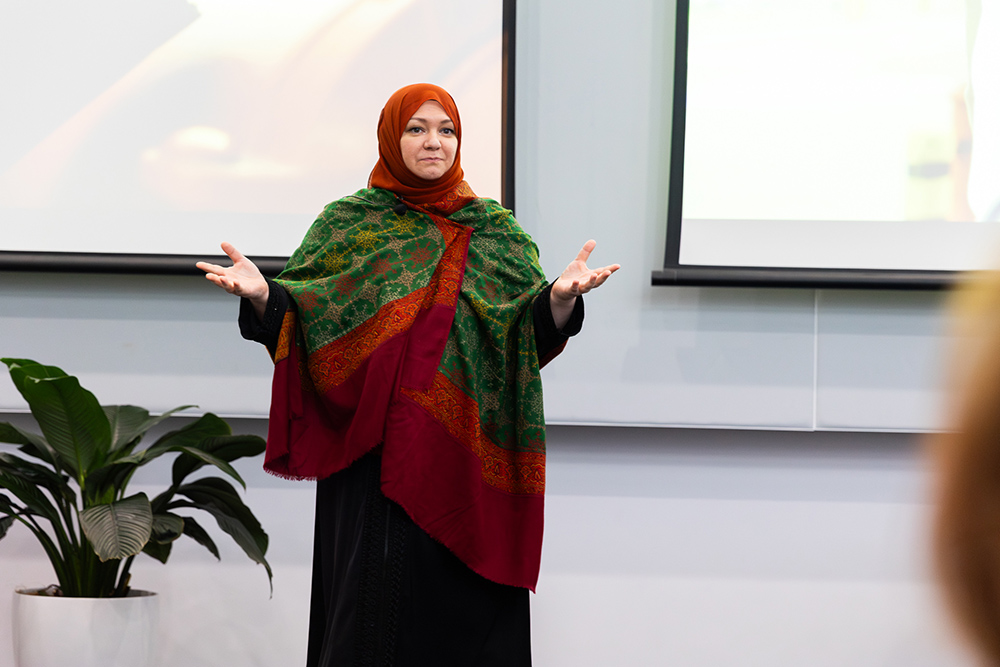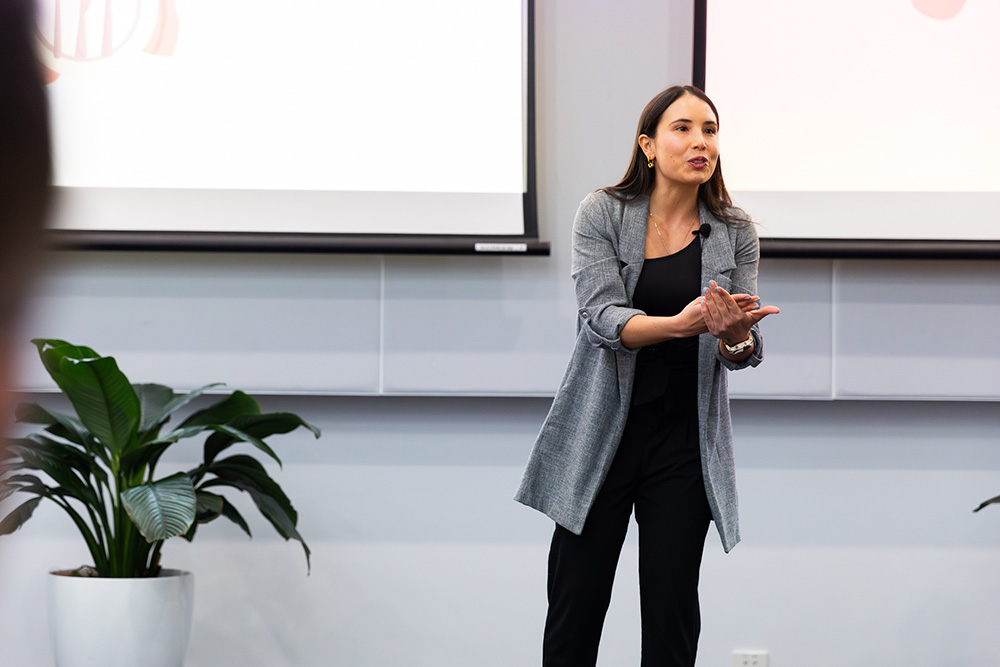Kailey Tonini
1 September 2023: The University of Canberra’s Three Minute Thesis (3MT) Final was an emotional celebration of passionate research that showcased the forefront of gender equality in academic research.
This year’s unique all-female finale saw seven Higher Degree by Research (HDR) candidates, representing four of the University’s faculties, pitch their thesis in three minutes or less for prizes, and the opportunity to represent the University at the Asia-Pacific Semi-Final at the University of Queensland in September.
The University’s 2023 winners are:
- Major prize: Senada Meskin (Faculty of Arts and Design)
- Runner-up: Sara Chica Latorre (Faculty of Health)
- People’s Choice Award: Sara Chica Latorre

Senada Meskin said she hadn’t anticipated taking home the major prize last night, but was incredibly moved by the support of her work, which explores the underrepresented experiences of Australian Muslim women in the workplace.
“I did not expect to win because I honestly, honestly believe that each and every one of us could have won easily, without question… I've grown really close to every participant, so we have this kind of sisterhood. So, if somebody else had won, I would feel equally excited,” Ms Meskin said.
"I'm at the very end of my research, so I don't need that much funding to travel or go to the participants or what else, but I do have research-related expenses that I need to pay off. So, my prize money will go to a good cause and I'm very happy about that.”
Three Minute Thesis challenges participants to condense their research into a three-minute speech, with one supporting static PowerPoint slide. Typically, a thesis is 80,000 words, and would take around nine hours to read in its entirety.
“Three Minute Thesis is a great challenge for our HDR candidates. Often, our passion and curiosity as researchers can mean we get caught up in the detail of our work – 3MT challenges us to step back, take a new perspective and view our work with fresh eyes,” said Deputy-Vice Chancellor of Research and Enterprise, Professor Lucy Johnston.
“It takes skill to captivate an audience and share complex information in a palatable way, but these skills are crucial to sharing high-quality, evidence-based research with the wider community. These skills are transferable to a career in research, teaching, industry, and everywhere in-between.
“I congratulate all our finalists and winners, and wish Senada the best of luck at the Asia-Pacific Semi-Final, where she will represent the University of Canberra,” she said.

Faculty of Health and UCRISE HDR candidate, Sara Chica Latorre, has made it her mission to address a gap in research around menstruation and its impact on female athletes.
Miss Chica Latorre, who took home both the People’s Choice and Runner’s Up prizes on the night, says the prize money will help boost her research capabilities.
“I'm feeling stoked!” Miss Chica Latorre said.
“I am going to use my prize money in two parts. First part, I'm going to use it for some hormonal testing. It's going to reinforce and strengthen methods for my last study, which was a little bit of a concern for me in terms of funding. Now, it's not anymore. And a little bit of money will go into participants' incentives, so I can make it a little bit easier to get more participants for my study.”
Three Minute Thesis began at the University of Queensland in 2008 and has grown to over 900 institutions across 85 countries. Participants start with faculty heats in their own institution, progressing to the university’s final where the winner progresses to the semi-final in September to compete with HDR candidates from other universities, before the final in October.
2023 University of Canberra 3MT finalists
Senada Meskin (Faculty of Arts and Design)
Australian Muslim women and paid work!
Senada’s thesis explores the severely under-researched phenomenon of how it feels to be a Muslim woman in Australia as well as an employee in a competitive industry.
Sara Chica-Latorre (Faculty of Health)
Tackling a bloody problem for women in sport
Sara’s research is investigating how the management of inflammation through diet can improve menstrual symptoms in athletes so they can work with their body and focus on performance.
Ayrin Assadimoghadam (Faculty of Arts and Design)
How can a building’s façade learn from nature?
Ayrin’s research and pitch focus on Adaptive Façade Strategy, an innovative approach that could optimise building façade performance, reduce heating and cooling costs, and help achieve more sustainability in Australia’s building sector.
Kithmini Aviruppola (Faculty of Education)
Breaking barriers, building bridges: unveiling the path to equitable university education
Kithmini’s research promotes equity in higher education so all students can reach their potential and succeed, and so there is more diversity within industry without forfeiting the quality of university graduates.
Keira Bai (Faculty of Science and Technology)
From hidden tears to genuine smiles
Keira’s thesis explores how artificial intelligence can capture micro expressions to decipher human emotional states in real-time and provide more objective diagnostic insights for mental illnesses such as depression.
Tayne Ryall (Faculty of Health)
Peer pressure in health training – we need more of it!
Tayne’s PhD thesis investigates simulation as a training and assessment tool for physiotherapy students to improve their clinical performance in work-integrated learning placements and work-readiness. Tayne was unwell and could not attend the final, so her pre-recorded pitch was played to the audience.
Cherry Wang (Faculty of Science and Technology)
Cherry’s research revolves around designing a dialogue agent that combines large language models with psychological theories to understand and respond to emotions in a supportive and contextually appropriate manner.
The University’s Three Minute Thesis competition is managed by the Graduate Research Office. More details about the competition can be found on the website.


